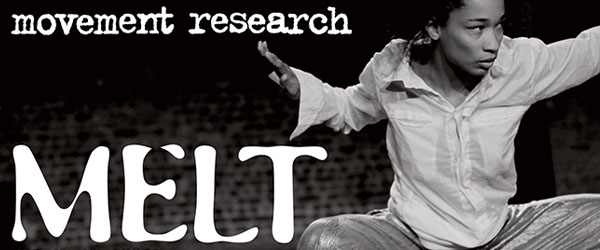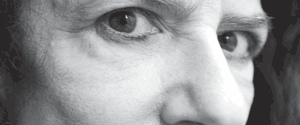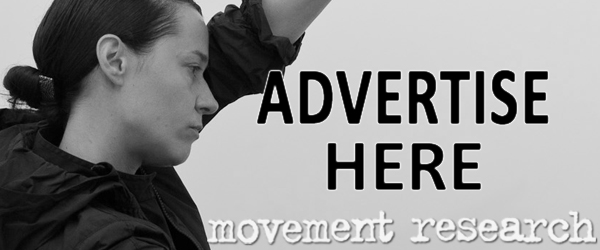Critical Correspondence
Jesse Darling and Jody Wood in conversation
Artists Jesse Darling (London, UK) and Jody Wood (Brooklyn, NY) discuss what they are working on during an August residency at Genesis Project in Brooklyn. Genesis Project (a program of Culture Push, directed by Arturo Vidich) is a short-term, intensive residency program for body-based, interdisciplinary artists. You can visit Genesis Project and see work-in-progress by Darling and Wood on Saturday, August 27 at 319 Scholes.
Thumbnail photo: production still from “Mythology of Dreams” (working title) by Jody Wood.
Interview date: August 18, 2011
Download this as a PDF version
Jody: This is Jody Wood speaking to Jesse Darling—both resident artists at Genesis Project. In both of our practices, we seem to be concerned with weaving together personal subjects with poetics, so in this conversation, I’m interested in articulating what seems to be an intuitive process for both of us.
Jesse: Alright. You start! Or maybe you just did.
Jody: I’m curious about what your artistic research process has been, specifically here during Genesis Project.
Jesse: Well, it’s been kind of intense to have this time, which is explicitly about process and making, but without any solitude—or a goal or audience in mind. I think I do work intuitively, by which I mean emotionally; and I didn’t come with any project in particular. I wanted to keep myself open to collaborations of all kinds.
Jody: Where has your intuition been leading you lately, and how has this open space & unstructured time led your practice these days?
Jesse: Open space and unstructured time are emotional for me. I’m a psychic autistic, I go adrift, get a little crazy. This is a good thing, to some extent; I chase around the streets, read a lot, look at things; everything seems very alive during such times. (I want to say now that Jody and I have the same birthday; we have observed a lot of correlation in our lives and praxes, so it’s interesting how we’ve both been using our time.)
Jody: So you feel like you’re absorbing right now—storing up energy to be untangled in your next project perhaps?
Jesse: Maybe, but this is kind of my story; looking for a way to formalize the science of being (particularly) alive. This is a commitment and also something I try to access in my work; I’m always looking for the moment, aware that I might be pinning butterflies, and also aware of the problems of over- or under-thinking concept. I guess that’s why video and installation are such natural mediums for me (and for you too)—they are “live” somehow.
Jody: It’s true—our similarities don’t end astrologically!
Jesse: How about you? I wanted to ask: where do you site yourself personally in your work? Your own life, your own themes?
Jody: My relationship with video is always evolving. It started as a means to document a ‘real’ moment in time—myself acting as a mediator between the public and an art audience, and then video became a means to document a performative gesture, putting myself simultaneously in front of and behind the camera. It’s only recently that I’ve become curious about the potential of video to be a living, breathing medium in it’s own right.
Jesse: What was it about the ‘real’ moment that you wanted to hold on to, or show?
Jody: I think we’re both very inspired by the poetics of everyday life. I suppose that is what I’m interested in holding onto—or reframing—as an artist.
Jesse: Yeah, life is a lot stranger than fiction. This is where I get my politics of contingency, I guess, which for me ties into this idea of the death of the author.
Jody: There’s also a lot of crossover with your life and the work you make—when you appear in your videos, how much are you performing yourself, and how much of it is an alter ego or character you’ve developed?
Jesse: To some extent, Jesse Darling has always been an alter ego. It’s not what’s on my passport, but it’s what I’ve been calling myself since I was 21, just because nobody had a surname in “The Movement.” I was hanging around with these politicos, you know. In a pretty apolitical capacity. I guess I liked how they were engaged with the apparatus; good art does that, too. I think I was telling you about how I should make all my friends and lovers sign waivers, because everyone ends up in the work and then I make them do what I want them to do, for my own purposes. Not live, necessarily, but in post-production, and in solitude. So I guess when I work with video I am recreating events…which strikes me as very different to the process you’ve been using in your recent work. You really have a storyboard and a vision, and the people in the videos are very much your “actors.” I mean you don’t put yourself forward as the subjective locus, but as the director proper. Is that a fair statement?
Jody: But you not only function as a sort of “puppeteer”—you are also physically present in your work. Even though I’ve begun to very specifically conduct the scenes in my video work, and don’t physically appear in these current projects, I feel very much a part of the subject matter. Although I don’t always intend to make work about my life, I always hit a certain point in the process when I feel that I’m suddenly waking up and seeing a mirror image, understanding myself and how the work reflects personal issues.
Jesse: So what’s your current subject matter, and how does it relate to you personally? (Aside: you know, I was thinking about the puppeteer thing; perhaps we are all, to a certain extent, puppets in the hands of one another, in a greater context, the rigors of social interaction, expectations of gender and race, apparatus of state, etc.—not in a deterministic way, but in the sense that we all must play a role?)
Jody: For instance, in the sleepwalker scene I shot this week, in which you were incidentally a main character, I’m interested in how the poetry of mythology in the form of archetypical characters—our ideas of god and death figures—are still very much a part of our lives, in the media and in our dream life. I love the idea of dream imagery becoming metaphors or riddles into understanding ourselves and our unconscious better. Jungian dream analysis posits that characters in our dreams are all alter egos of ourselves. In this way, the mythology of dreams is a personal mythology of the self. I’m exploring my own alter egos and mythology in this current project—telling my own story and also attempting to connect with a universal story.

Production still from "Mythology of Dreams" (working title) by Jody Wood. Actors Jesse Darling & Emma Fitzgerald, Genesis Project resident artists.
Jesse: Do you think the archetypes are universal through the ages, or do you think we have evolved new ones for changing times?
Jody: I think our changing methods of storytelling (i.e. through television and cinema versus an oral tradition) has perhaps created a lot of fragmented archetypical characters. In response to your puppeteer statement, I wonder how our roles as artists relate to our roles in relationships. How do you see your personal narrative and artist self in connection with larger socio-political issues?
Jesse: Well, as an artist I live fairly precariously, on the fringes of straight society—I often don’t know when my next paycheck is coming and because I work in relational media I don’t… participate in the economy of selling my work as commodity. In this way I’m no different to you or a lot of artists, but it makes me think about socio-economic relations and how they work, about class, about the question of work in general. I often struggle with the sense that as an artist I’m not doing anything revolutionary or worthwhile; however, I believe that sometimes the artist-as-trickster can be in a unique position to critique and undermine the dominant paradigm, even in very small ways, because we have nothing to lose from it. Peggy Phelan writes about “those who define themselves as liminal tricksters, socially disenfranchised, sexually aberrant, addicted and otherwise queerly alienated from the law of the father … queer because we recognize that we have survived our own deaths.” I relate very much to the personal-as-political praxes of queer culture, and to Foucault’s idea that we may have internalized the system within: in this way my practice is sometimes (nakedly, embarrassingly) my working through the internalized systems, and trying somehow for redemption, to be the change I wish to see. I’ve had the experience of somehow risking too much by putting my own body in my work, which is why I’m now looking at putting other bodies in the work in lieu—friends and lovers (although that’s risky too), the public in general, members of the audience. I know you have gone through a process, too, in which you have started to use other bodies: what were your reasons for doing this and how is the process different?
Jody: In my experience, as a performer, you’re blindfolded to how your actions may be appearing to an audience or to the camera you’re performing in front of, but you’re working with a ‘body knowledge’ of what feels compelling, and what your body naturally wants to do, and doesn’t want to do. Behind the camera, you only have the visual knowledge of what looks compelling, so it feels like a completely different process, and I’m very interested in fluctuating between the two methods. I feel like all of us here at Genesis Project need to be physically engaged with our art-making process, but also place a strong importance on concept. How do you personally work with intuitive and concept-driven decisions?
Jesse: I try to give them both a voice. I have a strong theoretical sense and a strong emotional/intuitive sense; I guess right now I’m prioritizing the former, but I have to come back around to the latter or else it won’t ring true; for me, or for anyone else. How about you? I’ve been amazed at watching you work—you seem to be in this zone: your intuitive decisions seem to create a whole system.
Jody: I’ve recently given myself more permission to work intuitively, which feels very freeing, especially where I am now, post graduate school recovery period! When I let intuition guide the work, the process seems much more alive—like an actual evolution or exploration that I learn from. I have one more question for you—I meant to ask it earlier because it has to do with death of authorship that you mentioned before—you often speak about contingency being an inspiration for your work: How do you see your role as artist/observer interrupting and intervening in everyday life, perhaps changing the course of contingent events?
Jesse: I think about how the camera forces an event to become an Event, and an encounter to become a Performance. That’s kind of par for the course in the age of PIDH [pix or it didn’t happen] in which everything is mediated to the nth degree: dance like nobody’s watching in the age of Facebook and cctv [closed circuit-television]? Yeah, right! The fact is, according to chaos theory there’s nothing entirely contingent; again, it sounds deterministic but it’s more a question of cause and effect. As a body in space I have a relationship to other bodies; as a mind in social space I have a relationship to other minds. Certainly I create artificial situations, but within these I like to “let it happen”—all kinds of things can and do emerge when you offer permission. Participation should be real, loaded, terrifying, exhilarating, and it should come with responsibility; the relational aesthetics tradition of staging an event in which the public is just symbolic bodies is, for me, the worst kind of narcissistic tokenism.
One more question for you, too. (I feel like the parallels in our work haven’t really emerged in the discussion, probably because there’s so much to say.) But I want you to say more about the relational “you” in your work—the maker, the director, someone in a relationship to a collaborator, someone in a relationship to the actor—does that make sense?
Jody: All of the work I make somehow routes back to the subject of interpersonal relationships. I work with a collaborator at times (Mikel Bisbee-Durlam), and our interpersonal relationship becomes a part of the process and part of the subject as well. I think what is so fulfilling about working with public participants in video or audio interviews is making a sometimes very deep connection with a complete stranger—something I wish happened more often in everyday life.
Jesse: Huh, so your work IS political! (In a previous discussion about this Jody said that her work is explicitly not political, although I disagree…)
Jody: Haha! Yeah, I must admit you had a good argument for politics in my work—I’m still not totally convinced though. We’ll save that topic for the next interview!




4:25 am
August 26, 2011
I loved the way these processes of conversation are offered as an event in themselves….starting out with two voices, the interplay of moments and insights that arise incidentally as the differences and samenesses uncoil in the voices : until the end when the harmonic emerging is heard as a third and unique voice itself, as new to the speakers as to the listener.
post a comment ›